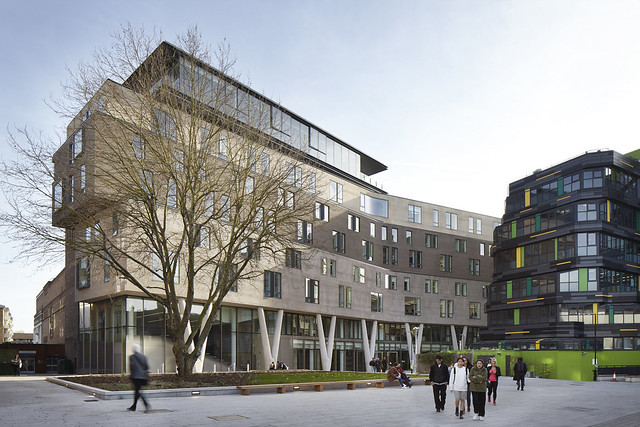Study options
- Starting in
- September 2025
- Location
- Mile End
- Fees
- Home: £12,850
Overseas: £31,500
EU/EEA/Swiss students
What you'll study
Our world-class teaching, research and industrial contacts will support you as you learn to describe, compare and apply a range of AI, machine learning and data science methods to the development and design of games.
The taught modules aim to teach you to:
- Programme computer games using industry-relevant technologies.
- Compare and select appropriate technologies in the context of game development.
- Identify theories and principles of game design and apply them to analyse specific games.
- Describe, compare and apply computational approaches to game-playing, interactive agents, content generation, and player modelling.
- Identify current trends in the games and AI industries.
You will work closely with your lecturers and supervisors to carry out a major project on a computer games topic that you want to specialise in.
Structure
- Eight compulsory modules.
- Core final project.
Find out more about each module by looking them up in the module directory.
Please note that all modules are subject to change.
Compulsory/Core modules
This module covers a range of Artificial Intelligence techniques employed in games, and teaches how games are and can be used for research in Artificial Intelligence. This module has a strong programming component. The module explores algorithms for creating agents that play classical board games (such as chess or checkers) and real-time games (Mario or PacMan), including single agents able to play multiple games. The module gives an overview of multiple techniques, such as Monte Carlo Tree Search, Evolutionary Computation, Deep and Machine Learning applied to games.
This module covers the fundamentals of game development in a multi-platform (consoles, PC, Web and mobile devices) environment. The course focuses on development of 3D games, covering all aspects of game development: the game loop, math, physics, audio, graphics, input, animations, particle systems and artificial intelligence. This module has a strong programming content, required for laboratories and assignments. The practical aspects will be taught using a popular game development platform. The main assignment of this module consists of the development of a full game at the student's choice.
This module covers games programming in C++, assuming the student has experience with object-oriented programming. The module introduces the C++ language and uses it to explores a range of topics in games programming, including 2D and 3D graphics, OpenGL, physics, input systems, and the use of C++ in modern game engines. It emphasises a practical approach to programming, with the students developing playable games for the final assessment.
This module covers the fundamental principles of game design and provides a practical introduction to the game design process, relevant to both physical and digital games. It examines games in terms of their formal and dramatic elements, and how these combine to create experiences for players. Students are guided through the process of developing their own non-digital games, from initial concept, through prototyping and playtesting, to a final design.
Modern video games employ various agents that interact with the player as opponents or characters, and that generate new content. This module covers the broad range of computational approaches developers currently use to create these in-game agents. The first part deals with techniques for authoring agent behaviour. The second part explores approaches procedural content generation for environments, narrative and others forms of game content.
This modules explores computational and data-oriented approaches to game design, drawing on both latest academic research and games industry practice . Topics include formal models of games, applications of game theory, game description languages, player modelling, gameplay and experience metrics, games user research, game analytics, and automated playtesting and game tuning The module is taught through a mixture of lectures, labs and seminars, with guest speakers from academia and the games industry.
There will be two main areas of content for this module: (i) creative AI procedures and practice and (ii) philosophical issues of Computational Creativity. The first area will cover the application of well-known AI techniques such as Deep Learning and Markov Models to generative projects, as well as ad-hoc techniques. These will be illustrated with applications in music, the visual arts and video game design, considering issues of human-computer interaction in these domains. The second area will raise and discuss questions around the value of having autonomous and semi-autonomous creative AI systems in society, drawing on philosophy, sociology, psychology and cognitive science, as well as engineering disciplines.
The MSc project gives you an opportunity to apply the techniques and technologies that you have learnt to a significant advanced project. Projects will either be significantly development based or have a research focus that will require you to undertake practical work. All projects will be expected either to investigate or to make use of techniques that are at the leading edge.
This course is concerned primarily with computer graphics systems and in particular 3D computer graphics. The course will include revision of fundamental raster algorithms such as polygon filling and quickly move onto the specification, modeling and rendering of 3D scenes. In particular the following topics may be covered: viewing in 2D,data structures for the representation of 3D polyhedra, viewing in 3D, visibility and hidden surface algorithms, illumination computations. Some attention will be paid to human perception of colour and interactive 3D such as virtual reality.
Please note that all modules are subject to change.
Assessment
- Modules are assessed through a combination of coursework and written examinations.
- You will also be assessed through a final project module.
Research project
Individual projects are undertaken during the summer months, under the supervision of an academic member of staff, with whom there are weekly consultancy meetings. These are used for students to report on their progress, discuss research and design issues, and plan their future work.
The Projects Coordinator also runs a thread of taught sessions to support the project module. A number of industrial-linked projects are offered each year, which students can apply for.

—The MSc programme was a perfect match for my career goals. It is designed to develop excellent game developers, extending beyond just programming skills. The programme also offers opportunities to build cross-cultural and interdisciplinary perspectives. Choosing Queen Mary, a prestigious university in London, provided me with the chance to meet students from various fields and participate more conveniently in cultural and industry activities in the city. The academics regularly share information about industry events, and we receive emails regarding career assistance and employability enhancement.
Yuan Zhao, MSc Computer Games, 2024
Teaching
You will learn by attending lectures, tutorials and labs. Each non-project-based module involves lectures, problem-solving coursework and practical sessions. Lectures are used to introduce principles and methods and also to illustrate how they can be applied in practice. Coursework allows students to develop problem-solving skills and gain practical experience. Practical lessons take the form of exercise classes and programming laboratories, that allow the students to learn by doing.
You will be assigned an Academic Advisor who will guide you in both academic and pastoral matters throughout your time at Queen Mary.
Where you'll learn
Facilities
The School has excellent bespoke facilities, including:
- Augmented human interaction (AHI) laboratory with 350 state-of-the-art computers.
- Antenna measurement laboratory.
- Media and arts technology studios (performance lab, control room, listening/recording room).
- Robotics laboratory (ARQspace).
Campus
Teaching is based at Queen Mary’s main , one of the largest self-contained residential campuses in the capital. Our location in the heart of London’s East End offers a rich cultural environment.
We have invested £105m in new facilities over the past five years to offer our students an exceptional learning environment. Recent developments include the £39m Graduate Centre, providing 7,700 square metres of learning and teaching space.
The campus is 15 minutes from Central London by tube, where you will have access to many of the University of London’s facilities, such as the Senate House library.

About the School
School of Electronic Engineering and Computer Science
The School of Electronic Engineering and Computer Science carries out world-class research – and applies it to real-world problems. Being taught by someone who is changing the world with their ideas makes for exciting lectures, and helps you to stay ahead of the curve in your field. 99 per cent of our research is classed as ‘world-leading’ or ‘internationally excellent’ (REF 2021).
We are proud of our excellent student-staff relations, and our diverse student body, made up of learners from more than 60 countries.
The School has a close-knit student community, who take part in competitions and extracurricular lab activities.
Career paths
Queen Mary’s Game AI Research Group and IGGI Centre for Doctoral Training has an established network of over 80 games companies, including Sony Interactive Entertainment, Creative Assembly, Bossa, and EA.
Students on this programme will benefit from our strong industry links, specifically through our research collaborations, and regular hosting of industry speakers at seminars and conferences.
Recent graduates from across the School have gone on to positions such as:
- Network Engineers
- Software Designers
- Specialist Engineers
- Systems Analysts
- Web Developers
In organisations such as:
- Barclays Capital
- Credit Suisse
- KPMG
- Merril Lynch
- Microsoft
- Nokia
- Selex ES
- Sky
Fees and funding
Full-time study
September 2025 | 1 year
- Home: £12,850
- Overseas: £31,500
EU/EEA/Swiss students
Conditional deposit
Home: £2000
Overseas: £2000
Information about deposits
Queen Mary alumni can get a £1000, 10% or 20% discount on their fees depending on the programme of study. Find out more about the Alumni Loyalty Award
Funding
There are a number of ways you can fund your postgraduate degree.
- Scholarships and bursaries
- Postgraduate loans (UK students)
- Country-specific scholarships for international students
Our Advice and Counselling service offers specialist support on financial issues, which you can access as soon as you apply for a place at Queen Mary. Before you apply, you can access our funding guides and advice on managing your money:
Entry requirements
UK
Degree requirements
A 2:1 or above at undergraduate level in Electronic Engineering, Computer Science, Software Engineering, Information Technology, Mathematics or a related discipline.
Other routes
Applicants with a good 2:2 degree (55% or above) will be considered on an individual basis.
Find out more about how to apply for our postgraduate taught courses.
International
English language requirements
The English language requirements for our programmes are indicated by English bands, and therefore the specific test and score acceptable is based on the band assigned to the academic department within which your chosen course of study is administered. Note that for some academic departments there are programmes with non-standard English language requirements.
The English Language requirements for entry to postgraduate taught and research programmes in the School of Electronic Engineering and Computer Science falls within the following English band:
Band 4: IELTS (Academic) minimum score 6.5 overall with 6.0 in each of Writing, Listening, Reading and Speaking
We accept a range of English tests and qualifications categorised in our English bands for you to demonstrate your level of English Language proficiency. See all accepted English tests that we deem equivalent to these IELTS scores.
Visas and immigration
Find out how to apply for a student visa.




